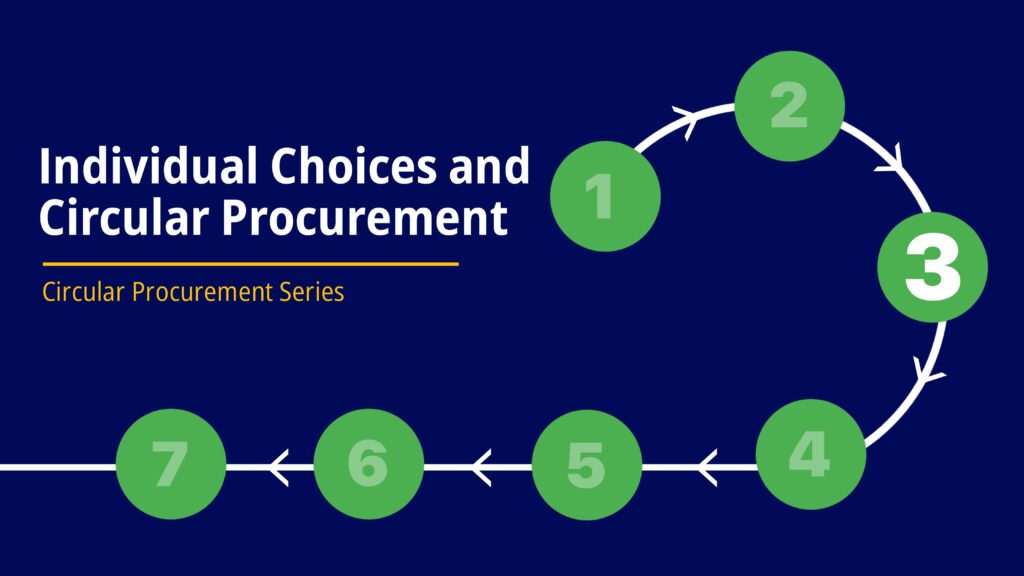Individual Choices and Circular Procurement

In recent times, the phrase “Circular Economy” has gained prominence among companies, organisations, and institutions. It’s almost fair to say that any organisation not introducing the Circular Economy concept to its employees or team might be lagging behind. The Circular Economy is currently in the spotlight! It essentially offers waste a new lease of life. This economic model advocates for waste to serve as the raw material for production, thereby reducing reliance on first-time or virgin raw materials. Unlike a Linear Economy that utilises virgin raw materials for production and then discards them, the Circular Economy regenerates new raw material from used materials to create new ones, thereby maintaining raw materials in a closed loop.
Achieving a Circular Economy involves various strategies, and one effective approach is through Circular Procurement. Circular Procurement involves purchasing items that minimise resource waste. This practice advocates for organisations to procure goods and services that rely less on virgin resources, consume less energy, and minimise adverse environmental impact.
While organisations or institutions may lead conversations and implementations of Circular Procurement as well as Circular Economy , a critical consideration arises: who constitutes the organisation —individuals or mere physical structures? Undoubtedly, individuals are pivotal in driving the Circular Economy. This is because, regardless of an organisation’s efforts to highlight or propagate the concept of the Circular Economy , its success hinges on individuals embracing it.
Individuals can play a crucial role in the move for Circular Procurement by adopting sustainable consumer behaviour, green or eco lifestyles, and choices to bolster the concept. These include; procuring circular or eco-friendly products, such as reusable cutlery, bags, and other items, rather than their single-use counterparts. A 2020 study revealed that every second, the world produces approximately 12 tonnes (12,000 kg) of plastic waste, and in 2023, global plastic waste is estimated to reach around 350 million metric tons.
Circular Procurement also necessitates responsible purchase and consumption by individuals. Opting for durable, high-quality items over fleeting ones, embracing ethical fashion (slow fashion), reducing plastic usage, and favouring digital communication platforms over paper documentation are essential steps. Individuals can also procure more plant-based and organic foods to decrease reliance on artificial and packaged foods, which deplete the earth’s virgin resources.
Additionally, responsible consumption advocates for increased use of renewable energy sources for homes, offices, and vehicles instead of finite fossil fuels. Another way individuals can promote the concept is by practising minimalist living, which challenges the prevalent consumerism culture. When people buy only what they need, manufacturers are inclined to produce less, leading to reduced use of raw resources and less irresponsible production. Participating in sharing economies, such as car-sharing and clothing swaps, reduces individual ownership and maximises resource utilisation.
Similarly, practising the R’s of sustainable living —Refuse, Reduce, Reuse, Repurpose, Recycle Repair, among others—is an individual’s responsibility that enhances the adoption of the Circular Procurement . Embracing DIY habits, repairing items instead of replacing them, and upcycling or repurposing items to increase their lifespan are choices that mitigate the need to tap into natural resources for creating new products.
By making a conscious pro-circular choice, individuals can influence manufacturers and service providers to consider producing more pro-circular products, reducing reliance on virgin resources and encouraging the creation of new products from what might have been deemed ‘waste’.
Circular Procurement undertaken by individuals offers a multitude of advantages, encompassing energy and cost savings, fostering the growth of the green industry, elevating the quality of life, and preserving our precious environment—be it the air, sea, or land. However, while Circular Procurement brings forth these merits, it also presents its own challenges. Individuals may encounter limited options when seeking eco-friendly products or services, unlike the ubiquitous presence of conventional alternatives. There might be an initial cost implication, as eco-friendly choices can often appear more expensive at first glance. Yet, in the long run, these investments often prove worthwhile. Additionally, a lack of awareness, inconveniences in adapting to new practices and the perceived complexity of indulging in Circular Procurement practices.
Nevertheless, each decision made by an individual resonates as a ripple effect in our economy’s journey towards circularity. Without choosing to embrace circular behaviours and lifestyles, the idea of a Circular economy may remain abstract. It’s a collective effort—where everyone, as individuals or within the framework of organisations, plays a crucial role in steering us toward achieving a Circular Economy .
References:
- https://www.visualcapitalist.com/cp/charting-the-movement-of-global-plastic-waste/#google_vignette
- https://theconversation.com/plastic-pollution-in-nigeria-is-poorly-studied-but-enough-is-known-to-urge-action-184591#:~:text=With%20the%20world%20population%20approaching,produced%20every%20second%20that%20year.







